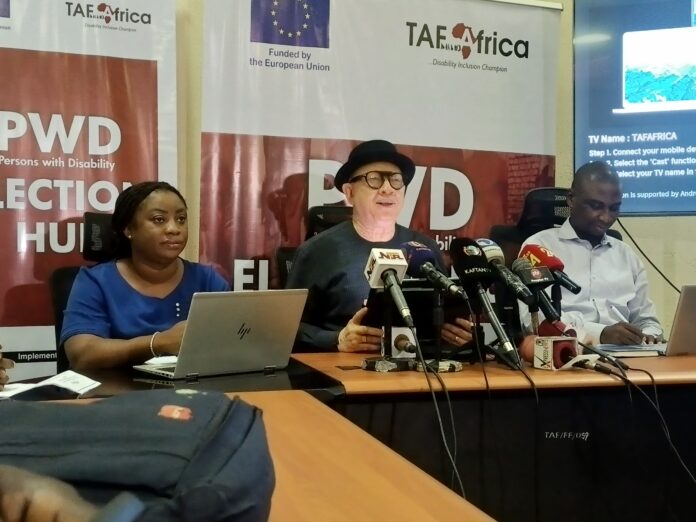The Albino Foundation Africa (TAF Africa) has called on President-elect Bola Tinubu and the states governor-elect to appoint as ministers and commissioners in the incoming federal and state cabinets.
The Chief Executive Officer and Founder, TAF Africa, Jake Epelle made this call during a press conference for the presentation of TAF Africa 2023 general election observation report on disability inclusion on Wednesday in Abuja.
He said that it is in fulfilment of disability law to appoint PWDs as ministers and commissioners.
“Section 29 of Discrimination against Persons With Disabilities (Prohibition) Act 2018 stipulates 5percent employment quota for persons with disabilities in any employment opportunity, it should be applied in this appointment but we are not demanding the 5percent, we are saying at least one person as a minister and in states, two or more commissioners. It is not enough to appoint PWDs as Special Advisers on disability. There are qualified Persons With Disabilities to function as Ministers and Commissioners”.
He expressed dismay that none of PWD candidates won at the polls in the last elections, their willingness to contest was a strong indication that they were capable of contesting elections in their various states and at the national level.
Mr. Epelle lamented that despite the disability inclusion interventions at the national level, the transition committee of the President-elect had no representation of the community of persons with disabilities and the outgoing President also omitted disability community.
Epelle said, “With the end of the 2023 general election and the emergence of elected individuals, an opportunity to drive disability inclusion and strengthen the political voices of persons with disabilities in Nigeria’s political process has been birthed.
“These elected individuals have a duty to entrench disability inclusion in their governance by making their political appointments disability-inclusive.
“By being appointed as ministers, commissioners, heads of parastatals, special advisers, etc, persons with disabilities are empowered to take their place alongside other citizens in effecting wide-ranging policies as it affects disability inclusion.
As it is said “Nothing About Us Without Us” relies solely on the principle of participation.
“No policy should be decided by any representative without the full and direct participation of members of the group affected by that policy, hence the need for disability inclusion in every sphere of governance.”The CEO added that elected candidates got into power with votes of the PWDs and, therefore, should not be sidelined when giving political appointments.
He noted, “We wish to express our disappointment that despite the disability inclusion interventions at the national level, the transition committee of the president-elect has no representation of the community of persons with disabilities.
“This could have been a unique opportunity to break down social stigmas by ensuring that persons with disabilities appear alongside other citizens as active participants in the transition process of the president-elect.
“As the world beams its torchlight on disability inclusion in electoral processes, we call on the president-elect, governors-elect, and all elected individuals in the 36 states of the federation, including the Federal Capital Territory, to take the opportunity of the vast awareness and global interventions available to collaborate and commit to driving disability inclusion in their governance, by appointing persons with disabilities to become political officeholders in their respective states.
“We also want to encourage all elected individuals to prioritize the appointment of persons with disabilities who contested positions during the 2023 general election but could not make it at the polls.”
TAF Africa, funded by the European Union through its Support for Democratic Governance in Nigeria presented the TAF Africa’s election report on disability inclusion.
These are some of the recommendations based on the findings.
Independent National Electoral Commission (INEC)
INEC should target PWDs in its mobilization efforts for the subsequent Continuous Voters Registration (CVR) exercise, for accurate data of PWD registered voters. The data should be disaggregated to capture different types of disabilities.
The Commission should intensify public awareness campaigns on voters’ education, using platforms that are inclusive and accessible for PWDs. Election officials should also be sensitized and trained on the needs and rights of PWDs.
A proper audit of the distribution of assistive devices should be carried out to ascertain what the cause and gaps were that led to the poor availability of assistive devices to identify polling units with persons with disabilities and put measures in place to forestall future occurrences.
Sign language interpreters should be provided in all polling units with persons with hearing impairment.
Security Agencies
Security agencies should properly investigate polling units that experienced political violence and thuggery and make sure that justice is served by bringing perpetrators to face the consequences of their acts.
Political Parties
Political parties should prioritize the participation of PWDs in their campaign rallies and other political activities and reserve at least 5% of the leadership positions within their parties for PWDs.
Political parties should increase awareness of the needs and rights of PWDs, and drum support for the candidacy of PWDs.


